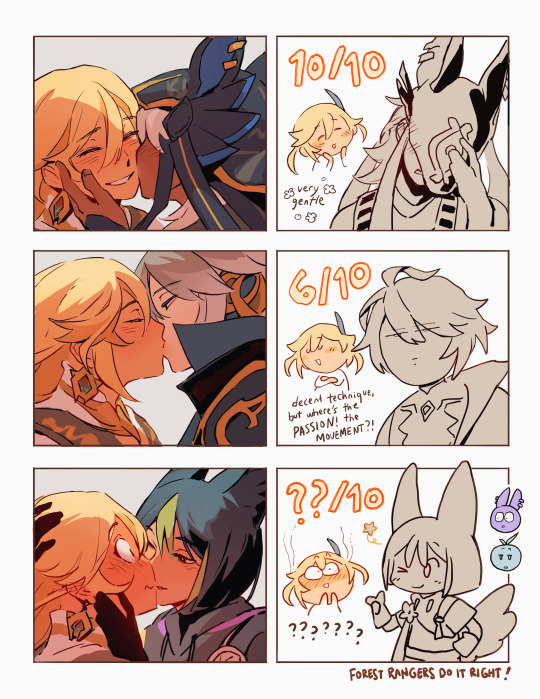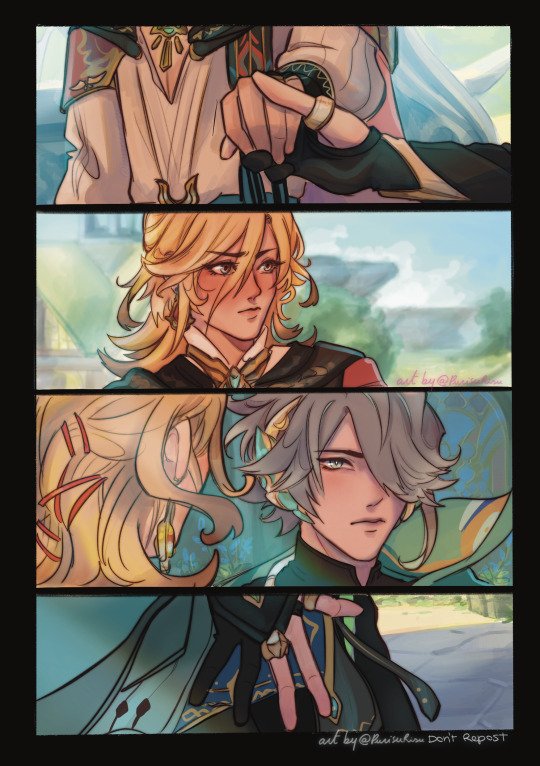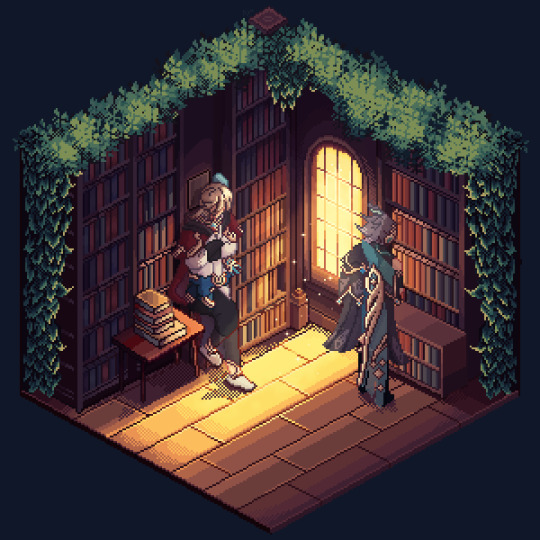Text

❝Let me get a taste of your forbidden fruit tonight..❞
247 notes
·
View notes
Text
The concept of family between Alhaitham and Kaveh
It was explained during Windblume that the concept of family in Sumeru (or at least the Akademiya) is based on academic convenience, as in, bonds are traditionally formed when the people involved share the same goals and are able to cooperate in research, since that’s what their personal professional pursuits and livelihood depend on.
From Windblume:
“Academic resources equate to social capital. It is not unheard of, for example, for people to build a family in order to pursue further studies.” “So the academic paper is the nexus of the academic family? Interesting.”
Interpreting Kaveh and Alhaitham’s relationship through this lens, they’re like a divorced couple whose academic cooperation (and therefore their family nexus) failed horribly in the past; but now that they are attempting to cohabitate due to reasons unrelated to the Akademiya, they (or maybe only Haitham so far) have realized that this independent bond can stand on its own.
The house they live in itself was a result of their academic cooperation, which in the Akademiya’s eyes was deemed successful despite ending incomplete. We still don’t know what produced their, uhm, academic breakup, but I feel like there might be something here about separating the conventional idea of a successful family in Sumeru from the concept of family the game has been building up so far.
From Alhaitham’s lore:
“Legally and socially speaking, since Kaveh has previously forfeited his right to the half of the house, he should pay the landlord during his stay. However, paying rent would, to some extent, deny his contribution to the research, which contradicts the academic spirit.”
Paying the landlord acknowledges the failure of their past (academic) relationship in a personal sense, but doing so denies the success of it in an academic sense. However:
“An intriguing matter to consider, but Alhaitham has no interest in the answer.”
Alhaitham has his own understanding of the world, after all, societal rules don’t dictate how he lives. Or how he feels. The current arrangement he has with Kaveh has allowed them to develop a more genuine relationship, beyond the conventions of the Akademiya, and his concept of family should also be a personal one.
Alhaitham is a simple person, all things considered, perhaps his idea of family will also turn out to be a mundane one.
From Alhaitham’s lore:
“As far as Alhaitham is concerned, Kaveh is a familiar face, similarly lacks familial attachments, and is the polar opposite of himself as a scholar —that is to say, an excellent mirror. Human vision is limited, but it can be perfected through the presence of another genius. Taking this opportunity, Alhaitham will be able to observe other aspects of this world and thus understand more things that may have otherwise been unfathomable.”
But would he actually be concerned with the idea of family? A family is more or less a micro society, a group of people who depend on each other to survive and support each other through the good and the bad.
Alhaitham is a character that exists independent from his relationship to others. Kaveh even doubts that traveler and Paimon are his friends when he brings them over. It is precisely because he isn’t burdened by the need to belong with other people that he was able to risk his comfortable desk job at the Akademiya in order to do the right thing (even if he claims he did it for selfish motives), he has no loyalties to anyone but his own principles.
We’ve seen the problems that belonging to a community conveys in Nahida and Alhaitham’s story quests: the people who wanted to avoid grief by staying with the memories of their dead loved ones, and the scholars who felt ostracized from their community and organized into a hivemind to share their strengths (though at the same time sharing their weaknesses).
Both gathered people with a unified interest that made the community function, but the nature of this collective commitment was fragile and fated to fail. But rather than focusing on individual faults, it’s important to note the characters who got involved in these communities were more a product of their environment and a victim to their own human vulnerabilities, whether grief, arrogance or loneliness.
Unlike Alhaitham —who has a comfortable job that pays well enough to spend on luxuries and doesn’t have any family members to take care of or fulfill filial piety for— characters like Ilyas were burdened by these constraints, and the additional emotional need to belong in society.
Alhaitham exists on his own outside the borders of society, but he understands that other people who are too weak to stand on their own need the support of a collective to survive and move forward.
In Nahida’s about Alhaitham she says:
“He holds a body of knowledge more advanced than most could imagine, and his mind is constantly thinking, so maybe nothing in this world could ever fool him. But is the wise man truly wise to view the mediocre majority as defective? Because without them, there is no us.”
In Chinese, that final “us” is between quotes. I interpret this in regards to the concept of society formed by vulnerable people discussed before. People come together because they have needs and flaws that can only be fulfilled and complemented within a collective.
The nation of Sumeru itself is a collective like this, formed by those in and out of the Akademiya. So, naturally Nahida argues that without those who are part of society, there is no nation.
The two collectives shown in Nahida and Alhaitham’s quests were unsuccessful, but that doesn’t mean success can’t be achieved.
The Grand Bazaar that supports the theater is depicted as a small community that thrives on human connection within the borders of the city in Nilou’s story quest and lore.
From Nilou’s story quest:
“Zubayr theater isn’t simply of performance value to us —it means more than that. It’s been our home for a long time. (...) Even Inayah wants to stay with us, and she’s starting to look forward to a new future. Zubayr theater exists for them… for every single one of us!”
This quest revolves around a father and daughter who seem separated by the very idea of academic family discussed earlier vs the concept of family bonds formed by pure human connection. At the end, they are able to reconcile and the father gives up on his intentions to dismantle the theater.
A collective formed on the basis of human connection is fated to succeed, Nahida is right about this. However, Alhaitham is not blind to this fact.
He has an exceptional intellect, but that doesn’t mean he lacks emotional intelligence as it’s usually assumed. He’s a character who appreciates emotionality where it’s meant to be valued. This was precisely the key to fight the sages at the Akademiya when they used Cyno as an involuntary mole:
“Emotions are part of our behavioral logic, but can you guarantee that every experience of the same joy and pain would be equally intense? How can our feelings and opinions be predictable down to the letter in every single instance?”
At the end of the Sumeru archon quest, he says this about the Grand Bazaar during the toast of victory:
“This gathering today has a unique meaning. The Grand Bazaar is lively because the people here feel happiness from the bottom of their hearts, unlike the farces at the Akademiya. That happiness is an emotion that’ll be forever alien to those bookworms who have driven themselves insane by studying.”
And then, immediately brings up Kaveh:
“...Hm, I seem to have taken both keys when I left the house.”
In this sense, it could be said that Kaveh is to Alhaitham what the people at the Grand Bazaar are to each other. A bond formed not on the basis of academic pursuits, but on human connection. It is not measured by the results produced of joint collaboration, and whether there’s failure or success, it can still stand on its own and act as a support for both parties.
185 notes
·
View notes
Text
mihoyo: and they were roommates
Kavetham shippers: omigod they were roommates
153 notes
·
View notes
Text











We've had a fun day in Teyvat while running around and causing chaos! :D
2 notes
·
View notes
Text




















And some random Screenshot I took while playing!
(okay, thats a lie..one is from the screenshot event cause i forgot it in the other post XD)
2 notes
·
View notes
Text








It's a screenshot event again! And you know what that means! Screenshots galore!
0 notes
Text
How Married Are Haikavetham? Let Me Count the Ways
I could write a whole essay about them but nobody reads those, so here, have a non-contextual and unordered list as befits social media postings in the Age of Twitter:
The 1950s sitcom couple domestic bitchery about cleaning and chores and dinner and jobs
Alhaitham being responsible for getting Kaveh home after a night on the town
The keys
Alhaitham purposefully teasing Kaveh to make him puff up and flail around every time they share screentime
The matching idles
Their very public bickering on almost every message board in Sumeru
Their signature dishes being from each other's cultural inspiration
Kaveh being Alhaitham's first (and only) friend at the Akademiya
Alhaitham thinking of Kaveh as his mirror
Kaveh moaning to everyone who will listen about his relationship with Alhaitham
Kaveh nevertheless dragging Alhaitham out for socializing
The polar opposite birb constellations
Kaveh potentially drunkenly feeling up Alhaitham and concluding he must be the dendro archon (no, really)
The fact that the only time Alhaitham ever collaborated with anybody on anything was the joint housing project with Kaveh
Kaveh stealing Alhaitham's wine shipment
Alhaitham apparently paying for every one of Kaveh's ridiculous expenses
Kaveh complain-gushing about Alhaitham in his character trailer
Kaveh demanding Alhaitham take him furniture shopping because he can't be trusted to pick out aesthetically pleasing stuff
Them introducing each other in their official character announcements
Kaveh designing rug patterns from Alhaitham's doodles
Them using each other's fucking rug patterns in combat I can't---!
293 notes
·
View notes
Text
Kaveh: You know, not every problem can be solved with a sword.
Alhaitham: That's why I carry two swords.
658 notes
·
View notes
Photo

kissing the homies goodnight 😚 especially kaveh
24K notes
·
View notes
Text

“You have bewitched me, body and soul, and I love…I love..I love you”.
Referencing THAT ONE Pride and Prejudice scene (two if you count the quote above)
8K notes
·
View notes






